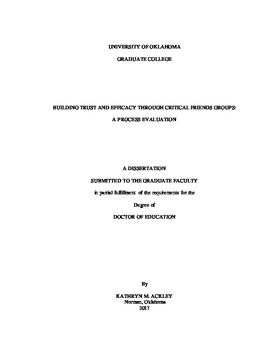| dc.contributor.advisor | Adams, Curt | |
| dc.contributor.author | Ackley, Kathryn | |
| dc.date.accessioned | 2017-05-15T16:52:53Z | |
| dc.date.available | 2017-05-15T16:52:53Z | |
| dc.date.issued | 2017 | |
| dc.identifier.uri | https://hdl.handle.net/11244/50874 | |
| dc.description.abstract | Two ongoing challenges that schools face, particularly urban schools, are finding ways to develop and retain quality teachers and to contribute to student academic success. There are claims that collaborative structures, such as Professional Learning Communities (PLCs), can nurture teacher learning and job satisfaction, and overall school effectiveness. Additionally, research has shown both faculty trust in colleagues and perceived teacher collective efficacy to be correlated with student achievement. This dissertation evaluates the implementation of a particular type of collaborative learning community, called Critical Friends Groups (CFGs) and the relationship between effective CFGs and school levels of faculty trust in colleagues and teacher collective efficacy. CFGs are a particular kind of learning community that is set apart by the use of specific protocols and the leadership of a trained facilitator to guide collaborative work.
The theory of action for this dissertation is based on Bandura’s social cognitive theory and posits that CFGs have the potential to create a social context for teacher learning within schools, in which faculty trust and collective efficacy are present. The following evaluation questions are addressed:
1. How do teachers in the district perceive the effectiveness of CFGs?
2. Is there a difference in the average CFG effectiveness across schools in the district?
3. Is there a relationship between teacher perceived CFG effectiveness and levels of Faculty Trust in Colleagues and Collective Teacher Efficacy?
4. What is known about the school climate for schools with different levels of teacher perceived CFG effectiveness?
5. In schools with high teacher perception of CFG effectiveness, what has contributed to the successful implementation of CFGs?
This evaluation found that there is, in fact, a statistically significant relationship between teachers’ perceptions of the effectiveness of their CFGs and school levels of faculty trust in colleagues and teacher collective efficacy. Additionally, it found relationships between CFG effectiveness scores and other school climate variables associated with student success. Finally, it identified school leader behaviors that contributed to the successful implementation of CFGs.
While the successful implementation of CFGs is dependent upon teacher ownership, the role of the school leader is critical as well. Implications for school leaders seeking to implement CFGs as a strategy for increasing trust and efficacy include a commitment of time for training and ongoing implementation of CFGs, as well as a need for patience to allow CFGs and the resulting trust and efficacy to develop over time. | en_US |
| dc.language | en_US | en_US |
| dc.subject | Professional Learning, Trust, Efficacy | en_US |
| dc.title | BUILDING TRUST AND EFFICACY THROUGH CRITICAL FRIENDS GROUPS: A PROCESS EVALUATION | en_US |
| dc.contributor.committeeMember | Forsyth, Patrick | |
| dc.contributor.committeeMember | Edwards, Beverly | |
| dc.contributor.committeeMember | Ford, Timothy | |
| dc.contributor.committeeMember | Steinheider, Brigitte | |
| dc.date.manuscript | 2017-05-12 | |
| dc.thesis.degree | Ed.D. | en_US |
| ou.group | Jeannine Rainbolt College of Education::Department of Educational Leadership and Policy Studies | en_US |
| shareok.nativefileaccess | restricted | en_US |
